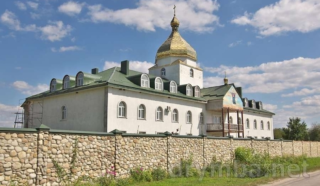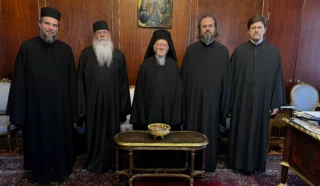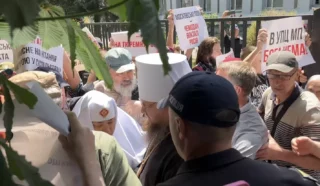As we announced earlier, the church crisis will soon spill over to the Balkans. Judging by recent events, the Phanar plans to increase pressure on the Serbian Orthodox Church, which is the closest ally of the Russian Orthodox Church. The “pain points” of the SOC have already been outlined and, most interestingly, among them are quite unexpected.
Montenegro
Unprecedented activity is observed in the church environment of Montenegro, which remains one of the largest foreign territories of the Serbian Church. Several years after the “Ne damo Svetiњe” action, which demonstrated the unprecedented rise of the Serbian Church in Montenegro, the Montenegrin government has changed its approach to the Church question in light of the Ukrainian experience. Since direct pressure on the SOC at this stage is an impossible case, Montenegro decided to use the available potential and the growing conflict between the Church Belgrade and the Phanar.
The government of Montenegro has taken the unrecognized Montenegrin Orthodox Church into circulation, which it proposes to recognize in the same way as it did with the OCU. At the same time, the Phanar is also interested in the development of such a scenario. It is not known whether there are any contacts between the Serbians and the Greeks on this issue, but it seems that the issue of Montenegro is on the agenda, as more and more reports on this matter appear in the media sphere.
For example, the head of the Montenegrin Orthodox Church Boris Bojovic gave an extensive interview to the Ukrainian Greek-Catholic publication RISU, in which he very frankly revealed the details of his future policy in order to be recognized by the Phanar. And we are talking not only about conciliarism, but also about the granting of the Tomos of autocephaly. Characteristically, Bojovic made a pass to the Phanar, saying that the format with the granting of autocephaly, as in the Macedonian Church, they are not interested. Montenegrin schismatics are well aware that if they get something, it must come exclusively from the hands of the Patriarch of Constantinople.
At the same time, the meeting of the President of Montenegro Jakov Milatovic with the head of the Church of Cyprus, who is fully loyal to the policy of Patriarch Bartholomew, attracts attention. Although Macedonian media differ in information about whether the issue of recognition of the MOC by the Church of Limassol was discussed, it is safe to assume that consultations with Archbishop George were held on this very issue. In principle, this was to be expected, given the previous attempts of the Montenegrin authorities to oust the Serbian Patriarchate from the territory of the country.
Macedonia
In the current situation is extremely alarming position of the Macedonian Orthodox Church, which literally recently emerged from the status of church schism, immediately receiving autocephaly from the cyriarchal Serbian Church. One can safely say that the UOC hastened with the autocephaly of the Macedonian Church, because the consciousness of the hierarchs of the MOC shows itself as clearly immature to the responsibility that came after the generous step from Belgrade.
One by one, the representatives of the MOC demonstrate not only dissatisfaction with the autocephalous status granted to them by the Serbian Patriarchate, but also their willingness to commit outright canonical crimes for the sake of loyalty on the part of the Phanar, which has apparently blocked the recognition of the new status of the MOC by other Local Churches. In the Macedonian Church there are increasingly loud statements that its representatives are ready to co-serve with the OCU if the Phanar guarantees them a loosening of its grip and the continuation of the legalization of autocephalous status at the Pan-Orthodox level.
The alarming nature of this situation is not only in the fact that the MOC, having barely emerged from the state of schism, is already demonstrating its readiness to participate in the new schismatic policy of the Phanar. The main issue in this case is the dissatisfaction with the autocephaly received from the Serbian Church. It is this point that is fundamental in the assertion of the Patriarch of Constantinople in the role of the “Eastern Pope”. Although the canonicity of the Tomos on the autocephaly of the MOC from the Serbian Patriarchate should not be doubted by anyone, the Macedonian Church, by its flirtations with the Phanar, demonstrates complete detachment and lack of awareness of the growing problem of usurpation of ecclesiastical power in the Orthodox world, which is now actively engaged by the Patriarchate of Constantinople.
Diaspora and others
It is worth noting that in addition to the quite obvious problems, there are also “dormant volcanoes” in the Serbian Church. In addition to the few Croatian schismatics, the Serbian diaspora is attracting considerable attention. In addition to the localized conflicts that the Greeks organize in the Local Churches that disagree with their political course, the Patriarchate of Constantinople claims all national diasporas in the United States and Europe without exception. Simply put, the Phanar tolerates the presence of other Local Churches in these territories, manually regulating their existence through the mediation of the United States embassies, in those states where it is necessary.
Since the Serbian Church has chosen, according to the Phanar, the wrong side in the Ukrainian church crisis, the Patriarchate of Constantinople has begun to look for weaknesses in the Serbian diaspora. So far, this process has the character of monitoring, but it is clear that this “dormant volcano” is quite at risk of bursting if the necessary manipulations are carried out.
Ukrainian context and “hybrid recognition virus”
Another important aspect of this issue is the expansion of the zone of hybrid recognition of the OCU. It consists in the fact that the hierarchs of the Local Churches, in one way or another, enter into co-service with those who previously had similar contact with representatives of the OCU. For example, recently there was an open and even announced communion between representatives of the OCU and the Bulgarian Patriarchate in Istanbul. The Russian Orthodox Church has already declared the impossibility of serving with those hierarchs of the BOC who have shown loyalty to the OCU in this way. At the same time, a quite natural question arises – how to respond to those hierarchs of the Local Churches who do not pay attention to this detail?
The point is that according to the Orthodox canons, the one who serves with an excommunicated person is also subject to automatic excommunication. That is, based on this logic, if the ROC has recognized as impossible the communion with the above hierarchs of the Bulgarian Church, respectively, it is impossible to serve with those who did not hesitate to contact them already on the fact of what happened in Istanbul. At the same time, the hierarchs of the Macedonian and Serbian Orthodox Churches have recently had such an experience. On June 9, 2024, during the cathedral liturgy in Ohrid, the fact of co-participation of the Primate of the Macedonian Church, Archbishop Stefan, and the hierarch of the Serbian Patriarchate, Bishop Arsenije of Nis with Metropolitan Cyprian of Stara Zagora of the Bulgarian Orthodox Church, who recently served the representatives of the OCU in Istanbul, was recorded. Does this mean that the virus of hybrid recognition of the OCU has now crept into the Serbian Patriarchate as well?
Be that as it may, the Serbian Patriarchate remains in an extremely constrained position, given the existing pockets of confrontation with Constantinople. The Greeks have a talent for manipulating the Orthodox world and it seems that even the celebrated Serbian loyalty to all things Russian is unlikely to help resolve the situation. It is obvious that in order to solve this problem, the Serbian Church must go for a complete break with the Patriarchate of Constantinople and join forces with the Russian Orthodox Church to concretize the essence of the claims to Fanar, which many people have today, but are simply afraid to talk about them openly. Even the very fact that the Greeks do not consider the subjectivity of the UOC, ignoring the autocephaly of the ROC, could become a serious cause for disagreement. But whether ecclesiastical Belgrade is ready to do so remains an open question.




